#noreika
Text
Hunter Biden Accused of Perjury: Claimed Active Connecticut Bar Membership Under Oath Despite Suspension for Unpaid Fees | The Gateway Pundit | by Jim Hᴏft
78 notes
·
View notes
Text
Meanwhile: the case that the media won't cover is the reason DC telephoned Cali Fanie to (suddenly) move on Trump. American's aren't stupid & neither is the Judge!
From the Comments:

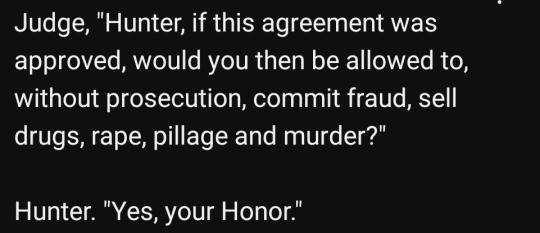


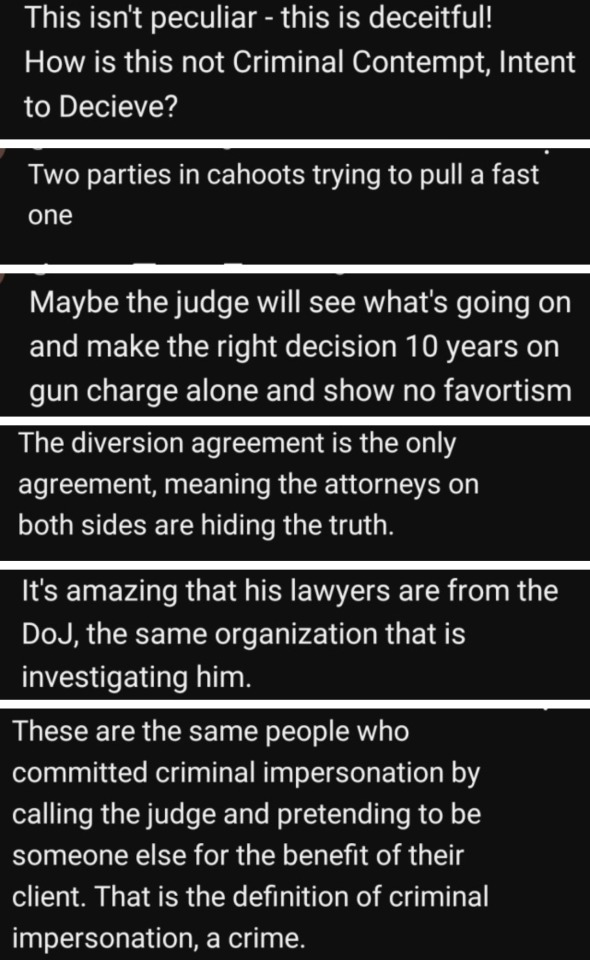




#get trump#fat fanie#fat alvin#fat leticia#dirty cops#warlock jack smith#banana republic#trump is innocent#racist cops#biden crime family#hunter biden
12 notes
·
View notes
Text
(JTA) — Legend has it that in the early 14th century, the grand duke of Lithuania set out on a hunting trip. One night, he dreamt of an enormous iron wolf, which a priest would later tell him was a sign that he should establish a city on the site where he had slept.
Whether or not the origin story is true, it’s uncontested that the present-day Lithuanian capital Vilnius was first referred to by its former name, Vilna, in documents and letters in 1323 — making this year, in the government’s eyes, the city’s 700th anniversary.
The city is marking the anniversary year throughout 2023 with various festivals, visual art exhibitions, lectures and more. The organizers of Vilnius 700 stress that they are including Jewish people and themes in the celebrations through a range of programming.
That’s because for a portion of the city’s existence, starting in the early 19th century, Vilnius was also one of the most important Jewish centers in the world, known as the Jerusalem of the North. Roughly half of the city was Jewish, and it was a Jewish cultural powerhouse, a deep well of Yiddish and Hebrew literature. In 1910, the city had over 100 synagogues, along with Jewish schools, publications, and charitable and political organizations.
“The Jewish community is an integral part of Vilnius’ past and present, playing an important role in the city’s day-to-day life,” Tomas Gulbinas, Vilnius’ deputy mayor, wrote in an email.
Yet this weekend also marks a darker anniversary: 80 years since the final liquidation of the Vilna Ghetto, a Jewish ghetto that saw almost all of its over 50,000 Jews die at the hands of the Nazis.
On Saturday, Lithuanian Prime Minister Ingrida Simonyte joined others in a march from the city’s former Jewish ghetto to Paneriai, the forest site formerly known as Ponary where the Nazis and their local collaborators murdered 70,000 Jews, mostly Lithuanian, over three years during the Holocaust.
The twin anniversaries have brought into stark relief tensions over historical memory in Lithuania, where, as in neighboring Poland and Latvia, officials have downplayed the role of local collaborators in carrying out the Nazis’ murderous plans. Memorials to Lithuanians who fought with the Nazis against the Soviet Union are plentiful in the city, making that history loom both literally and figuratively over the 700th birthday party.
“There is an unresolvable tension between desire to celebrate and this history that is not much to celebrate,” said Laimonis Breidis, a Vilnius native whose book “Vilnius: City of Strangers” explores the city’s history through the insights of travelers. The biggest challenge, he said, is that “everything told about the city is compartmentalized.”
Almost all of the few thousand Jews living in Vilnius today have familial ties to people who died during the Holocaust, said Faina Kukliansky, chair of the Lithuanian Jewish (Litvak) Community. She said in an interview earlier this year that the community was more determined to commemorate the ghetto anniversary than the city one.
“I promise you, we, the Lithuanian Jewish community, will not forget this date,” she said.
How Lithuania’s Holocaust history is remembered became an issue of high drama in 2019, after a Chicago schoolteacher named Sylvia Foti published a book recounting how her grandfather — Jonas Noreika, a general and formerly a national hero — had agreed with the Nazis about the extermination of Jews.
The book caused an uproar. Lithuania’s parliament then voted to remove the head of a national genocide research center, Adas Jakubauskas, after he insisted Noreika had tried to save Jews; 17 historians wrote to the center complaining that Jakubauskas was compromising the quality of their research. For his part, Jakubauskas charged that he was being pressured by Israel and Russia to indict Lithuanian participants without evidence.
Yet the country continues to memorialize the Holocaust without calling attention to the role that Lithuanians played in carrying it out. Dani Dayan, chairman of Yad Vashem, Israel’s Holocaust memorial authority, said this week in a special session of the Lithuanian Parliament that the country “must consistently acknowledge that many of the Lithuanian Jews massacred in the Holocaust died at the hands of their Lithuanian co-nationals and that Lithuanians also took part in the extermination of Jews in neighboring countries.”
Such an acknowledgement is not a centerpiece of the Vilnius 700 programming, in part because its emphasis on celebration is focusing attention to happier moments in local Jewish history.
Gulbinas listed the Jewish-themed projects the city has undertaken in conjunction with its 700th anniversary: city tours, put on by Undiscovered Vilnius, that highlight the city’s Jewish history; the city’s involvement in the reconstruction of the Great Synagogue of Vilnius, which was mostly destroyed by the Nazis; the renovation of the grave of the Vilna Gaon, a hugely influential 18th-century rabbi, and the upkeep of Jewish cemeteries; and a graffiti art project, “Walls That Remember,” in which artists have painted images harkening back to the era when the city’s Jewish community was thriving.
“Simultaneously, Vilnius honors the present Jewish customs and traditions, for example, by celebrating Hanukkah together with the local Jewish community every year,” Gulbinas wrote.
A pavilion at the National Museum of Lithuania that is open until Oct. 15 recreates Vilnius as it stood 200 years ago — at the dawn of the city’s Jewish heyday.
Meanwhile, the Jewish community has held events tied to the ghetto anniversary outside of the Vilnius 700 umbrella. Earlier this month, in the courtyard of the former Jewish Council headquarters in the Jewish Ghetto, Šimonytė attended an exhibition and concert on the liquidation anniversary.
On Thursday, the city of Vilnius introduced a commemorative route — ”Panerių kelias,” or road of Paneriai, named for the site of a massacre of 100,000 people, many of whom were Jewish, during World War II — along which processions were organized on that same day and on the 24th. An additional exhibition, “Healing Soul Wounds,” which, per an official from the city, “reveals the traumatic experiences and dilemmas of young girls, teenagers and women in order to survive the brutal conditions of World War II and the Holocaust,” opened last week.
In a few cases, the histories — that of Vilnius and that of the Vilna Ghetto — were commemorated together in official Vilnius 700 events. At a concert outside the former Vilna Ghetto Jewish Council in July, Michael Gordon, the American composer and founder of the acclaimed Bang on a Can music collective, whose father grew up outside of Vilnius, debuted an original composition for nine trombones.
The courtyard was Gordon’s idea. The organizers of the music component of Vilnius 700 reached out to him, he said, and sent a list of sites where he could debut an original composition. In his reply, he said, he pointed out that “there’s a big and long and illustrious history of Jewish culture, both secular and sacred, in Vilnius, and none of these sites are Jewish sites. Can we consider a Jewish site? And they said yeah, great.”
Gordon chose the courtyard in part because of its connection to Jewish arts: on one side of the courtyard stood a Yiddish theater; on another, a Yiddish conservatory. And the city also has a personal connection to Gordon, whose father, a Litvak, lived in Vilnius in the 1930s. He called his composition “Resonance.”
Roughly 300 people came to the concert, said Gordon, who spoke a little about the event about “the presence of Jewish culture in Lithuanian history.”
“I was happy about that,” he said. “I kind of felt it was my responsibility…I felt, wow, I have this opportunity to go here and, in a certain sense, honor the Jewish history in this place, in this very important center of Jewish learning and Jewish arts and culture.”
That kind of attention was all too rare in the past, according to Laima Lauckaite, the curator of a collaborative exhibition between the Lithuanian Art Centre TARTLE and the YIVO Institute for Jewish Research in New York City that is open now. Lauckaite did not grow up fully aware of her city’s Jewish history while a schoolgirl during the Soviet years near where the Great Synagogue of Vilna once stood. Soviet authorities had razed the synagogue’s ruins and erected a school; underground remains were not identified until 2015.
“I never knew about it, that there was the Great Synagogue,” she said. “I got to know about it only 30 years after.”
The collaborative exhibit in New York City displays an exhibition of Vilnius guidebooks that reflect the city’s 19th and 20th century history and “its multi-ethnic, multicultural landscape.” Lithuanian President Gitanas Nausėda visited YIVO last week to pay tribute to the Jews who rescued rare books and documents from the Vilna Ghetto.
Dovid Katz, former professor of Yiddish Studies at Vilnius University, has spent the past 15 years editing Defending History, a site dedicated to fighting Holocaust distortion. He has also participated in numerous events to mark Vilnius 700.
“While it is very nice that authorities have included Jewish-themed programs in the year’s commemorations dedicated to the city’s history, it is shameful that they have not permanently taken down any of the state-sponsored public-space shrines to Holocaust collaborators and perpetrators,” Katz said.
He stressed that the narratives downplaying Lithuanian culpability in the Holocaust emanated from a relative few influential nationalists, not the mass of Lithuanians celebrating Vilnius.
“I love living here. The people of today’s Lithuania are terrific,” he said. “The problem is with a small ultra-powerful, state-funded ‘history fixing unit’ that dominates on these issues in politics, museums, media, arts and academia.”
Katz suggested, as well, that the Jewish community should have focused on a different anniversary — and that its attention to the September dates related to the ghetto’s liquidation reified the country’s Holocaust memory problems.
“Of the thousands of Lithuanian Jewish Holocaust survivors we interviewed over more than three decades, all felt that the appropriate day for commemoration of the Lithuanian Holocaust is June 23rd,” he said. On that day in 1941, “600 years of peace was broken by the outbreak of barbarity, humiliation, slaughter in hundreds of towns across the land. By the end of 1941, all the close to 250 or so storied shtétlakh (shtetls) were destroyed, as were the overwhelming majority of Lithuanian Jews.”
Focusing only on the liquidation of the ghetto, he said, “reflects a state attempt to deflect from the primary narrative via one that focuses only on the Germans (the ghetto history) and not on the thousands of local participants all across the land.”
Vilnius 700 events are scheduled through the end of the year, ensuring that the tensions over history and memory in the city continue to simmer.
But not all see the need to bring up the city and Holocaust anniversaries in the same conversation. David Roskies, chair emeritus in Yiddish literature at the Jewish Theological Seminary in New York, wrote in an email: “I don’t see any intersection between the two anniversaries. It’s pure happenstance. Who can say with any precision when Vilnius was established?”
8 notes
·
View notes
Text
18 notes
·
View notes
Text
Open-Source Platform Cuts Costs for Running AI - Technology Org
New Post has been published on https://thedigitalinsider.com/open-source-platform-cuts-costs-for-running-ai-technology-org/
Open-Source Platform Cuts Costs for Running AI - Technology Org
Cornell researchers have released a new, open-source platform called Cascade that can run artificial intelligence (AI) models in a way that slashes expenses and energy costs while dramatically improving performance.
Artificial intelligence hardware – artistic interpretation. Image credit: Alius Noreika, created with AI Image Creator
Cascade is designed for settings like smart traffic intersections, medical diagnostics, equipment servicing using augmented reality, digital agriculture, smart power grids and automatic product inspection during manufacturing – situations where AI models must react within a fraction of a second. It is already in use by College of Veterinary Medicine researchers monitoring cows for risk of mastitis.
With the rise of AI, many companies are eager to leverage new capabilities but worried about the associated computing costs and the risks of sharing private data with AI companies or sending sensitive information into the cloud – far-off servers accessed through the internet.
Also, today’s AI models are slow, limiting their use in settings where data must be transferred back and forth or the model is controlling an automated system.
A team led by Ken Birman, professor of computer science in the Cornell Ann S. Bowers College of Computing and Information Science, combined several innovations to address these concerns.
Birman partnered with Weijia Song, a senior research associate, to develop an edge computing system they named Cascade. Edge computing is an approach that places the computation and data storage closer to the sources of data, protecting sensitive information. Song’s “zero copy” edge computing design minimizes data movement.
The AI models don’t have to wait to fetch data when reacting to an event, which enables faster responses, the researchers said.
“Cascade enables users to put machine learning and data fusion really close to the edge of the internet, so artificially intelligent actions can occur instantly,” Birman said. “This contrasts with standard cloud computing approaches, where the frequent movement of data from machine to machine forces those same AIs to wait, resulting in long delays perceptible to the user.”
Cascade is giving impressive results, with most programs running two to 10 times faster than cloud-based applications, and some computer vision tasks speeding up by factors of 20 or more. Larger AI models see the most benefit.
Moreover, the approach is easy to use: “Cascade often requires no changes at all to the AI software,” Birman said.
Alicia Yang, a doctoral student in the field of computer science, was one of several student researchers in the effort. She developed Navigator, a memory manager and task scheduler for AI workflows that further boosts performance.
“Navigator really pays off when a number of applications need to share expensive hardware,” Yang said. “Compared to cloud-based approaches, Navigator accomplishes the same work in less time and uses the hardware far more efficiently.”
In CVM, Parminder Basran, associate research professor of medical oncology in the Department of Clinical Sciences, and Matthias Wieland, Ph.D. ’21, assistant professor in the Department of Population Medicine and Diagnostic Sciences, are using Cascade to monitor dairy cows for signs of increased mastitis – a common infection in the mammary gland that reduces milk production.
By imaging the udders of thousands of cows during each milking session and comparing the new photos to those from past milkings, an AI model running on Cascade identifies dry skin, open lesions, rough teat ends and other changes that may signal disease. If early symptoms are detected, cows could be subjected to a medicinal rinse at the milking station to potentially head off a full-blown infection.
Thiago Garrett, a visiting researcher from the University of Oslo, used Cascade to build a prototype “smart traffic intersection.”
His solution tracks crowded settings packed with people, cars, bicycles and other objects, anticipates possible collisions and warns of risks – within milliseconds after images are captured. When he ran the same AI model on a cloud computing infrastructure, it took seconds to sense possible accidents, far too late to sound a warning.
With the new open-source release, Birman’s group hopes other researchers will explore possible uses for Cascade, making AI applications more widely accessible.
“Our goal is to see it used,” Birman said. “Our Cornell effort is supported by the government and many companies. This open-source release will allow the public to benefit from what we created.”
Source: Cornell University
You can offer your link to a page which is relevant to the topic of this post.
#A.I. & Neural Networks news#agriculture#ai#ai model#applications#approach#artificial#Artificial Intelligence#artificial intelligence (AI)#augmented reality#Bicycles#Cars#cascade#Cloud#cloud computing#cloud computing infrastructure#collisions#Companies#computation#computer#Computer Science#Computer vision#computing#dairy#data#data storage#Design#Developments#diagnostics#Disease
2 notes
·
View notes
Text
3 notes
·
View notes
Text
BREAKING: The new "Conditions of Release" for Hunter Biden have just hit the docket, signed by Judge Maryellen Noreika, who shelved Hunter's plea deal
If Hunter does NOT comply with any part of the order, he could be immediately arrested
▪️HUNTER IS REQUIRED TO:
1) NOT possess a firearm
2) NOT use or possess any controlled substances (including marijuana)
3) Submit to full federal supervision
4) NO use of alcohol AT ALL
5) Seek active employment
6) Submit to testing for prohibited substances
7) Participate in substance abuse therapy
▪️PENALTIES FOR VIOLATING COULD INCLUDE:
1) Immediate issuance of an arrest warrant
2) Revocation of release
3) Forfeiture of bond
4) Prosecution for contempt of court
DO YOU THINK HUNTER WILL ABIDE BY HIS TERMS OF RELEASE?
3 notes
·
View notes
Text
15 notes
·
View notes
Text
When Hunter Biden entered a federal courtroom on Wednesday, July 26, he was expected to plead guilty to two charges of failing to pay taxes. President Joe Biden's son had agreed to a plea deal with federal prosecutors, who promised to drop a gun-related charge in exchange for a "guilty" plea on the tax matters.
But the deal fell apart — at least temporarily — when
U.S. District Judge Maryellen Noreika raised questions about it, saying she felt she was being asked to act as a "rubber stamp." Noreika told Hunter Biden, "Without me saying I'll agree to the plea agreement, how do you plead?" And he pled "not guilty" to all charges.
NBC News journalists Phil McCausland and Tom Winter report, however, that the younger Biden "is expected to reverse his plea if a new agreement or the new information eventually satisfies Noreika."
READ MORE: 'Truly off the wall': Journalists debunk Hunter Biden conspiracy theories
McCausland and Winter explain, "Noreika, who was appointed by President Donald Trump, pressed both sides about the terms of the agreement struck with U.S. Attorney David Weiss of Delaware, another Trump appointee, whom President Joe Biden kept on to oversee the case. She expressed clear concern about how two separate deals — one regarding the unpaid taxes and the other about a gun possession charge — potentially intersected, as well as her purview over them."
2 notes
·
View notes
Text
Joe Biden Visits Hallie Biden, Beau’s Widow And Hunter’s Lover, Before She Testifies In Hunter’s Trial
On Sunday, the weekend before his daughter-in-law Hallie is due to testify in the trial of his son Hunter on gun charges, President Joe Biden visited her at her home.
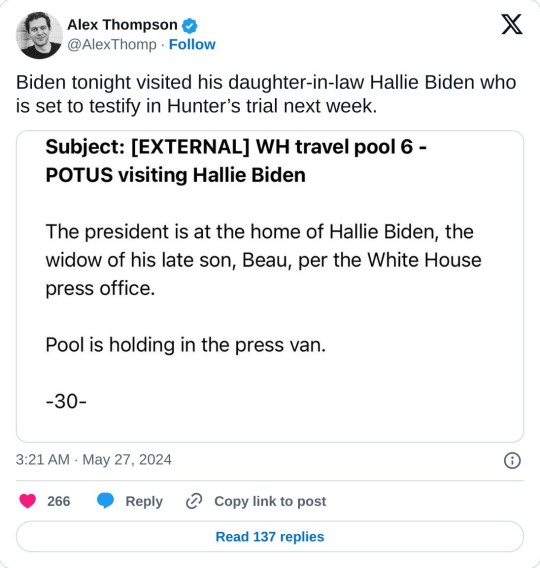
Special counsel David Weiss is alleging that Hunter Biden illegally bought a revolver in 2018 and falsely claimed that he was not an unlawful drug user, CBS News noted. Judge Maryellen Noreika said the prosecution must prove Hunter Biden was addicted to drugs at the time, but they don’t have to prove he was using drugs the day he bought the gun.
“A source with knowledge of the Oct. 23, 2018, police report told Fox News that it indicated that Hallie Biden, who is the widow of President Biden’s late son, Beau, and who was in a relationship with Hunter Biden at the time, threw a gun owned by Hunter Biden in a dumpster behind a market near a school,” Fox News reported.
Hallie Biden was married to Biden’s son Beau, who died of glioblastoma on May 30, 2015, at the age of 46. Beau Biden was twice elected as the Attorney General of Delaware; during his tenure, he served for a year in Iraq with the Judge Advocate General (JAG) Corps.
Hallie Biden married Beau Biden in 2002, but after he died, she engaged in a romantic relationship with his brother, Hunter, in 2016, which lasted until 2019. Hunter Biden was going through a separation from his wife, Kathleen, who reverted to her maiden name, Buhle, in 2019. Buhle later said she only discovered the affair after her daughters, whom she said had seen texts on their father’s phone, urged the family’s therapist to inform her.
*** I'm sure it's nothing.. No pressure, No extortion. Just reminding her that she is a BIDEN!!
Imagine if this happened in any fashion, to the Trump family.
1 note
·
View note
Text
HUNTER BIDEN Firearm trial date set

Lengthy court battle may haunt president’s reelection campaign
WILMINGTON, Del. — The judge overseeing Hunter Biden’s federal firearms charges trial agreed Friday to block prosecutors from telling jurors about some other unflattering episodes from his personal life, but left the door open to allowing them in if the president’s son testifies.
It’s unclear whether the president’s son would take the stand during the trial that could last up to two weeks during his father’s reelection campaign and likely include sharp disagreements over evidence.
President Joe Biden’s son is charged with lying about his drug use in October 2018 on a form to buy a gun that he kept for about 11 days in Delaware.
A trial is set to begin June 3 and could last up to two weeks as his father’s reelection campaign unfolds.
Hunter Biden has acknowledged an addiction to crack cocaine during that period, but his lawyers have said he didn’t break the law and the case is politically motivated.
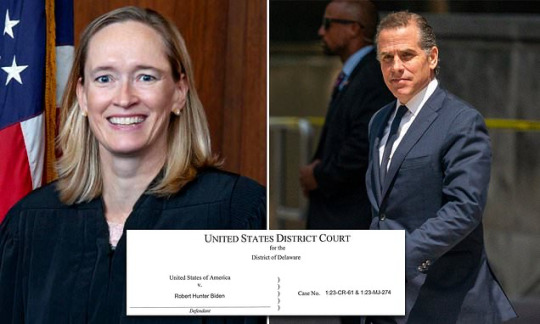
Prosecutors won a victory on a key point as U.S. District Judge Maryellen Noreika found that they wouldn’t have to prove that he specifically used drugs on the day of the purchase.
She agreed to a defense push to keep out other details about his past, including a child-support case in Arkansas and his dismissal from the Navy after a positive drug test.
She also agreed to consider defense questions about the contents of a laptop that he allegedly dropped off at a Delaware repair shop.
Hunter Biden’s attorneys want to raise questions about the authenticity of the laptop’s data at trial.
Prosecutors say that there’s no evidence it has been compromised and that a drawn-out fight would be a waste of time.
The laptop has been the source of controversy for years after Republicans accessed and disseminated personal data from it.
Hunter Biden is also facing federal tax charges in Los Angeles and is set for trial in that case in September.
He’s accused of failing to pay at least $1.4 million in taxes over four years while living an “extravagant lifestyle” during a period in which he has acknowledged struggling with addiction.
The back taxes have since been paid.
Hunter Biden gun trial starts June 3, might run for 2 weeks
WILMINGTON, Del. — Hunter Biden’s trial on federal firearms charges in Delaware could last up to two weeks and likely include sharp disagreements over evidence as it plays out during his father’s reelection campaign.
President Joe Biden’s son is charged with lying about his drug use in October 2018 on a form to buy a gun that he kept for about 11 days in Delaware.
Hunter Biden has acknowledged an addiction to crack cocaine during that period, but his lawyers have said he didn’t break the law and the case is politically motivated.
He didn’t speak to reporters as he accompanied his lawyers to and from the Wilmington courthouse for a hearing on Friday.
Prosecutors won a victory on one key point as U.S. District Judge Maryellen Noreika found that they wouldn’t have to prove that he specifically used drugs on the day of the purchase.
She agreed to consider, however, defense questions about the contents of a laptop that he allegedly dropped off at a Delaware repair shop.
Biden’s attorneys want to raise questions about the authenticity of the laptop’s data at trial.
Prosecutors say that there’s no evidence it has been compromised and that a drawn-out fight would be a waste of time.
The laptop has been the source of controversy for years after Republicans accessed and disseminated personal data from it.
Noreika said she will consider objections to specific pieces of data as the trial unfolds.
Prosecutors also plan to show jurors portions of his 2021 memoir “Beautiful Things,” in which he detailed his struggle with alcoholism and drug abuse following the 2015 death of his older brother, Beau, of brain cancer at age 46.
Defense attorneys argued prosecutors were cherry- picking evidence, and the judge agreed to allow Biden’s attorneys to introduce wider selections.
His attorney Abbe Lowell also says there are indications that the gun-purchase form was changed by employees after the sale.
Prosecutors say there were only minor additions unrelated to the parts Biden filled out.
Noreika didn’t immediately rule on whether the defense could introduce an altered version of the form at trial, which is expected to begin with jury selection June 3.
She agreed to block prosecutors from introducing other unflattering episodes in his personal life, though she said those could come in if
Biden decides to testify.
“There’s a number of issues that may become more contentious should Mr. Biden testify,” Noreika said.
Hunter Biden is also facing federal tax charges in Los Angeles and is set for trial in that case in September.
His lawyers have pushed unsuccessfully in both cases to have them dismissed.
They have argued, among other things, that prosecutors bowed to political pressure to indict him after a plea agreement hit the skids in court and was publicly pilloried by Republicans, including former President Donald Trump, as a “sweetheart deal.”
0 notes
Text
✌Noreika Immunity - Robert Hunter Biden - New Original Court Document✌
https://berndpulch.org/2024/04/15/%e2%9c%8cnoreika-immunity-robert-hunter-biden-new-original-court-document%e2%9c%8c/

0 notes
Text
Hunter Biden’s gun case could go to trial by June
Hunter Biden could face trial in Delaware on federal firearms charges as early as June, amid his father’s re-election campaign, Politico informed.
US District Judge Maryellen Noreika set a tentative date during a brief telephone hearing on Wednesday, despite considering several defence motions to dismiss the case against the president’s son that could yet derail any potential trial.
The trial is scheduled on 3 June and could last up to nine days. A separate hearing on the tax charges against him in California is tentatively scheduled to begin later this month.
Hunter Biden, son of President Joe Biden, pleaded not guilty to lying about his drug use in October 2018 on a form to buy a gun that he kept for about 11 days. He admitted being addicted to substances during that period, but his lawyers argued he did not break the law.
Read more HERE

#world news#world politics#news#us#us politics#us news#usa news#usa politics#usa today#united states#america#united states of america#usa#joe biden#biden#hunter biden#hunter biden laptop
1 note
·
View note
Text
Tic-tac: Se apropie ziua judecății pentru Hunter Biden
Fiul președintelui american Joe Biden, Hunter Biden, va fi judecat în iunie, relatează Bloomberg.
Georgiana Arsene
Un judecător federal a decis miercuri că Hunter Biden va fi judecat pentru acuzații de posesie de arme de foc în mai puțin de trei luni. Audierea va începe pe 3 sau 10 iunie, notează publicația.
Agenția scrie că judecătoarea Maryellen Noreika, de la Delaware County Circuit Court,…
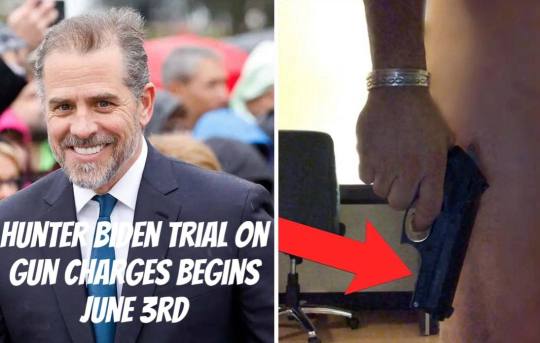
View On WordPress
0 notes
Text
Amazon now offers a phone-based palm scanning service for sign-up purposes - Technology Org
New Post has been published on https://thedigitalinsider.com/amazon-now-offers-a-phone-based-palm-scanning-service-for-sign-up-purposes-technology-org/
Amazon now offers a phone-based palm scanning service for sign-up purposes - Technology Org
Amazon’s palm scanning service now offers the convenience of sign-up directly from your mobile device.
Palm features used in personal identification. Image credit: Amazon
Instead of requiring a visit to a physical location, users can now enroll in Amazon One by capturing images of their palm using the newly launched Amazon One app, available on both iOS and Android platforms. This streamlined process enables users to set up their accounts swiftly, facilitating the use of palm scanning for authentication purposes at supported locations.
Previously, Amazon One enrollment requited visiting designated physical sites, where users could link their palm print to their Amazon account for various purposes such as making purchases or age verification.
[embedded content]
Presently, this service is accessible at all Whole Foods stores across the US, select Panera Bread locations, and over 150 other venues, including stadiums, airports, fitness centers, and convenience stores.
Amazon One utilizes advanced generative AI technology to analyze the unique vein structure of the palm, generating a distinct numerical vector representation for identification during in-store palm scans. It’s noteworthy that Amazon does not utilize raw palm images for identification purposes.
On the mobile app, Amazon employs AI algorithms to compare the photo captured by the phone’s camera with the near-infrared imagery obtained from an Amazon One device. Users are required to integrate a payment method within the app and upload a photo of their identification for age verification purposes if desired. Additionally, the app allows for the linking of loyalty programs, season passes, and gym memberships.
While privacy concerns surrounding the technology persist, Amazon asserts that palm and vein images are promptly encrypted and transmitted to a highly secure section within the AWS Cloud, specifically designated for Amazon One. It is in this secure environment that Amazon creates the unique palm signature.
Furthermore, Amazon emphasizes that the new app incorporates additional layers of anti-spoofing measures, and it explicitly prohibits the saving or downloading of palm images to the user’s device. Nonetheless, some individuals may remain apprehensive about relinquishing their biometric data, considering the irreplaceable nature of palm prints compared to traditional passwords.
Written by Alius Noreika
#A.I. & Neural Networks news#Accounts#ai#Algorithms#Amazon#android#app#authentication#Authored post#AWS#aws cloud#biometric#biometrics#Biometrics news#bread#Cloud#data#Developments#Environment#Featured information processing#Features#Fintech news#generative#generative ai#Hardware & gadgets#images#iOS#it#Link#Method
0 notes